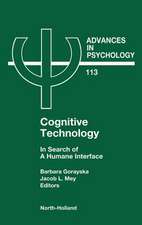Humane Interfaces: Questions of Method and Practice in Cognitive Technology: Human Factors in Information Technology, cartea 13
Editat de J.P. Marsh, B. Gorayska, J.L. Meyen Limba Engleză Hardback – 6 apr 1999
Preț: 1068.50 lei
Preț vechi: 1335.62 lei
-20% Nou
Puncte Express: 1603
Preț estimativ în valută:
204.48€ • 212.70$ • 168.81£
204.48€ • 212.70$ • 168.81£
Carte tipărită la comandă
Livrare economică 14-28 aprilie
Preluare comenzi: 021 569.72.76
Specificații
ISBN-13: 9780444828743
ISBN-10: 0444828745
Pagini: 391
Ilustrații: 1
Dimensiuni: 156 x 234 x 24 mm
Greutate: 0.74 kg
Editura: ELSEVIER SCIENCE
Seria Human Factors in Information Technology
ISBN-10: 0444828745
Pagini: 391
Ilustrații: 1
Dimensiuni: 156 x 234 x 24 mm
Greutate: 0.74 kg
Editura: ELSEVIER SCIENCE
Seria Human Factors in Information Technology
Cuprins
Introduction. Methods and Practice in Cognitive Technology: A question of questions (B. Gorayska, J. Marsh, J. Mey).
Theoretical Perspectives. Mind Change or changed minds? Commentary and chapter summaries. Investigations in Cognitive Technology: Questioning perspective (B. Gorayska, J. Marsh). Can We Change Our Minds? The Impact of Computer Technology on Human Cognition (R. Lindsay). Computers and Psychosis (R. Janney). The Natural and the Artificial in Language and Technology (H. Haberland). Understanding Users: The knowledge-level of analysis (A. Vera). Augmentation, Mediation, Integration?
Commentary and chapter summaries. The Cyborg's Dilemma: Progressive embodiment in virtual environments (F. Biocca). Cognitive Tools Reconsidered: From augmentation to mediation (K. Kuutti). The Meeting Place of Cognition and Technology (B. Karpatschof). Honesty of Affordance (W. Fitzgerald, E. Goldstein). The Design of Cognitive Tools (S.D. Tripp).
Cyberspace Bionics (J. Vidal). Cognitive Space(M. Krueger).
Applied Methods.How do we convert principles into valid and validated applied methods? Commentary and chapter summaries.
On Why the Blind Leading the Blind is a Good Idea (D.Good).
Between the Idea and the Reality: The case for qualitative
Research in education (I. Hart). Computer Environments Designed to Promote Cognitive Change through the Development of Well Reasoned Recommendations (A. Kass, J. Herman). Evolution of Man's Needs and Technological Progression: Pragmatic foundations for a relational coupling (C.T. Schmidt, P. Ruch). Successful Technology Must Enable People to Utilise Existing
Cognitive Skills (M. Kitajima).
Palmtop Reminding Devices: Capabilites and limitations(D. Herrmann, C. Yoder, V. Sheets, J. Wells, B. Brubaker). A User Designed Contextualisation Method for an Argumentation Support Tool (J. Sillince). Cognition Oriented Software Verification (W. Halang). Index.
Theoretical Perspectives. Mind Change or changed minds? Commentary and chapter summaries. Investigations in Cognitive Technology: Questioning perspective (B. Gorayska, J. Marsh). Can We Change Our Minds? The Impact of Computer Technology on Human Cognition (R. Lindsay). Computers and Psychosis (R. Janney). The Natural and the Artificial in Language and Technology (H. Haberland). Understanding Users: The knowledge-level of analysis (A. Vera). Augmentation, Mediation, Integration?
Commentary and chapter summaries. The Cyborg's Dilemma: Progressive embodiment in virtual environments (F. Biocca). Cognitive Tools Reconsidered: From augmentation to mediation (K. Kuutti). The Meeting Place of Cognition and Technology (B. Karpatschof). Honesty of Affordance (W. Fitzgerald, E. Goldstein). The Design of Cognitive Tools (S.D. Tripp).
Cyberspace Bionics (J. Vidal). Cognitive Space(M. Krueger).
Applied Methods.How do we convert principles into valid and validated applied methods? Commentary and chapter summaries.
On Why the Blind Leading the Blind is a Good Idea (D.Good).
Between the Idea and the Reality: The case for qualitative
Research in education (I. Hart). Computer Environments Designed to Promote Cognitive Change through the Development of Well Reasoned Recommendations (A. Kass, J. Herman). Evolution of Man's Needs and Technological Progression: Pragmatic foundations for a relational coupling (C.T. Schmidt, P. Ruch). Successful Technology Must Enable People to Utilise Existing
Cognitive Skills (M. Kitajima).
Palmtop Reminding Devices: Capabilites and limitations(D. Herrmann, C. Yoder, V. Sheets, J. Wells, B. Brubaker). A User Designed Contextualisation Method for an Argumentation Support Tool (J. Sillince). Cognition Oriented Software Verification (W. Halang). Index.






























